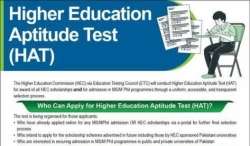Under the "Sindh Right of Children to Free and Compulsory Education Act, 2013", children will fall into the disadvantaged criterion if their parents' monthly income is less than the minimum wage � Rs8,000 � fixed by the government.
If the owners of the private schools violate the new law i.e. charge fee from these children or subject them or their parents to their "screening procedures", they shall be fined between Rs50,000 and Rs100,000 and face imprisonment ranging from one to three months.
The law also makes it compulsory for parents or guardians to send their children to school. The government promises through the law to arrange pre-school or special training for the children who have crossed the given age limit to bring them at par with other students.
The government also vows to set up a system of grants-in-aid to support school attendance of poor students. It will also provide incentives to the private sector to establish schools that facilitate free and compulsory education.
The provincial government and metropolitan corporations will provide funds for the implementation of the law.
An "Education Advisory Council" will be established comprising nine members having expertise in education, child rights and child development to advise the government on the implementation of the new legislation. The council will ensure that every child attends school.
Senior Education Minister Pir Mazharul Haq, who moved the bill, informed the House that the Act was being brought in compliance with Article 25-A of the Constitution that declared free and compulsory education a fundamental right of children aged between five and 16 years.
Th minister maintained that Sindh was the first province implementing the 18th Constitutional Amendment.
"There is no opposition from any party representing the Sindh Assembly but there may be some acrimony exhibited by others on issues other than compulsory education," Haq said. "No law is perfect."
He pointed out that the civil society and prominent educationists were consulted and they supported the new law.
Haq, who is also the parliamentary leader of the Pakistan People's Party in the House, recalled that under UN's Millennium Development Goals, Pakistan was supposed to achieve 100 percent literacy rate by 2015, but unfortunately that was unlikely to happen.
Muttahida Qaumi Movement's parliamentary leader in the assembly, Syed Sardar Ahmed, stressed the need for proper implementation of the law.
"This law should have been introduced three years ago when the 18th Constitutional Amendment was passed."
Ahmed, who has served as a chief secretary, recalled that Sindh was the first province in newly-created Pakistan where education was compulsory.
He pointed out that the provincial government had also promulgated the Sindh Compulsory Primary Education Ordinance in 2001.
Besides, around 15 years ago, th Sindh Education Foundation was set up but the province did not make any progress in the educational sector. Ahmed regretted that scant attention had been paid girls' education in Sindh.
"Laws are good, but they have to be implemented to achieve the desired results," Ahmed noted.
PPP's Munawar Abbasi suggested that the provincial government should take responsibility for providing funds to ensure free and compulsory education up till the secondary level. "All local governments might not have the sufficient funds to carry out this task," he added.
Arif Jatoi of the National People's Party said the government should provide incentives to private schools in line with the developed countries i.e. the US and England.
The education minister responded that private schools in the country were earning in millions and did not need such incentives.
Pakistan Muslim League-Functional's Marvi Rashdi proposed that immunisation should also be made mandatory for school admissions. PPP's Humera Alwani pointed out that of the 72,000 Madrassas in the country, 18,000 were in Sindh. "The government should monitor them and be aware of what is being taught there," she suggested.
PPP's Anwar Mahar recommended that the government should focus on improving the standard of government schools.



.webp)
.webp)
.webp)
.webp)
.webp)



